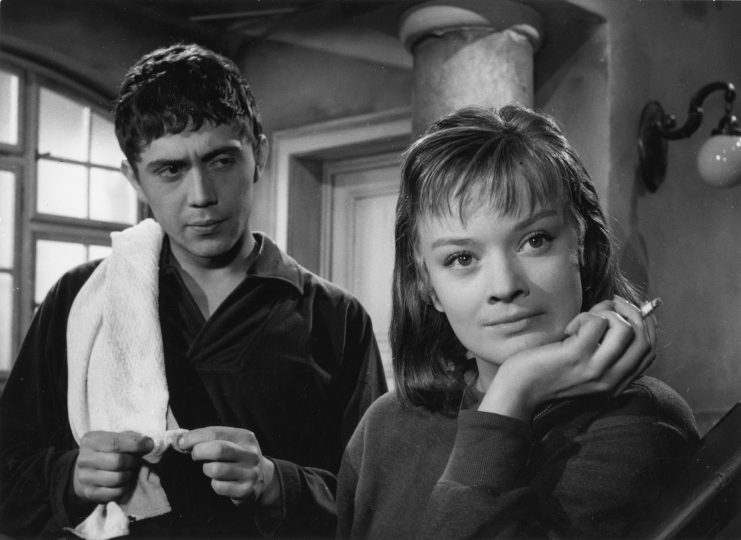After Václav Krška’s The Road Back (Cesta zpátky, 1958) and Pavel Blumenfeld’s The Crossroads (Křižovatky, 1959), Jiří Krejčík’s Awakening (Probuzení, 1959) represents another Czech contribution to the series of films about socialist youth led astray. But the idea for a psychological drama starring Jana Brejchová preceded both aforementioned films. People’s judge and screenwriter Otakar Kirchner introduced it already in 1956. He wanted to show the empty lives of Prague yobs, their transformation and self-realisation and present young audiences with a story with a moral.
During his research, Kirchner read piles of court files, visited youth institutions and detention centres, interviewed wardens, attendants, pedagogues and inmates. He tried to find shared characteristic features and incidents. He was interested in the psyche of young offenders, their way of thinking and emotions. He used his findings to write a script co-authored by Jiří Krejčík. It’s working title was Sentenced to Live (Odsouzení k životu) and it was composed of several authentic episodes. The psychology of the characters was based on extensive research and confrontation with reality.
To the leading role, Krejčík cast Jana Brejchová, who starred in his Mrs. Dulská’s Morals (Morálka paní Dulské, 1958). In Awakening, the future film star portrays a 16-year-old hairstyling student. The orphaned girl says she is “terribly rotten.” To prove this, she escapes a juvenile detention facility and goes to Prague where she joins three yobs who spend their time in cafés and bars, swindling, stealing and even listening to rock’n’roll. Vilda, Emil and Marcel share a common trait – they don’t deliberate their actions, they are controlled by momentary impulses and live in the moment.
Krejčík gave the roles of two of the boys to then unknown DAMU students Petr Kostka (Vilda) and Jiří Kodet (Emil). Marcel was played by FAMU Cinematography student Jiří Štíbr. To prepare for their roles, the actors read court files and testimonies about troubled youth – just like Kirchner when he was writing the script.
As a counterpart to the brats, the director chose Jan Šmíd who previously had a small role in a socialism-building film titled Giant Shoe-Factory (Botostroj, 1953). Šmíd plays a waiter apprentice named Tonek who’s growing in an atmosphere of constant bickering between his father and stepmother. The essentialy honest boy falls in love with Jitka who, despite her hard outer shell, longs for love and happiness and draws the young man into a yobbish world.
The film limits its focus on the five adolescents and doesn’t analyse their adolescence in a broader social context. Neither does it explore their family background (with the exception of Tonek). Instead, it vividly depicts their offences culminating in a fateful car accident and escape from justice. With the help of cinematographer Vladimír Novotný, Krejčík enriched the skilfully directed psychological story whose authenticity is emphasised by the performance of the young actors with an impressive urban atmosphere.
The production started with on-location shots at the river Berounka near the Křivoklát castle. After finishing exteriors, Krejčík’s crew moved to the streets of Prague, mainly near the Wenceslas Square. The car accident was filmed near the Florenc Bus Station in Prague. A large part of the film takes place in an enclosure where the young heroes spend their days and night in the mud. Its exteriors were filmed in Holešovice and interiors in the Hostivař Studios.
The original intention of the authors was to make an impression using a negative example without romanticising the lives of the hooligans which was what the period press criticised on western productions of similar orientation. In the original version, Tonek fails to steer Jitka in the right direction. But the censorship committee didn’t approve the pessimistic ending and Krejčík had to film an ethical and hopeful frame and turn Awakening into a retrospectively narrated story of love. Thanks to it, the young lovers are able to find their way back to life.
Despite the forced alterations, the critics and the management of nationalised film industry mostly rejected the film. In light of the criticism of the social role of the Czech film the Bánská Bystrica Film Festival, most condemnations of the entire series of films about troubled youth were aimed at Awakening. The critics said that the film doesn’t look for causes and doesn’t show any positive role models. Krejčík defended his creative intentions during a debate held at the 2nd Festival of Czechoslovak Film in Pilsen where Awakening was screened. According to his own words, he wanted to inspire reflection, not offer an example to follows.
In his following film A Higher Prinicple (Vyšší princip, 1960), Krejčík instead of young rebels focused on exemplary young citizens who, unlike the heroes of the educational moral Awakening, don’t need to go through any reformation.
Awakening (Probuzení, Czechoslovakia 1959), director: Jiří Krejčík, screenplay: Otakar Kirchner, Jiří Krejčík, director of photography: Vladimír Novotný, music: Zdeněk Liška, cast: Jana Brejchová, Jan Šmíd, Petr Kostka, Jiří Kodet, Jiří Štíbr, Ladislav Pešek, Eva Šenková, Vlasta Chramostová, Marie Brožová et al. Filmové studio Barrandov, 95 min.

